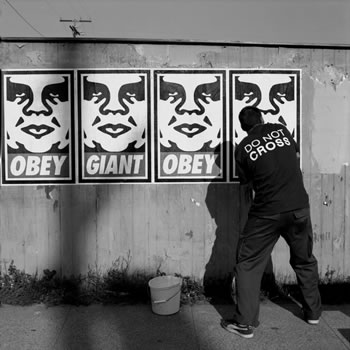 The ‘i love you’ (ILY) message would appear to be unstoppable, all in the same sloppy cursive hand; new ones seem to appear daily. In its anonymity and simplicity it has become a force free of authorship: easily repeatable, and existing solely in the public domain. While the abundant scribblings have only begun to make waves here in Vancouver, we are merely the newest city to become part of what is a global campaign, the I Love You World Graffiti Project. Its design is largely informed by accessibility with the goal of perfect outreach; thus no one may be exempt from the writing's sentiment. Its form, as street art, certainly reinforces this message of universality. Displayed prominently on bus stops, on fences, on sidewalks, on bathroom stalls, on the sides of buildings many stories up, and even on the bark of trees, the ILY is deliberately placed to contact every urban denizen or visitor. Thus, the message becomes one of universal love as dictated by medium and because there is sure more than one “I,” the source further extends this theme of non-exclusion. Part of the ILY World Graffiti Project’s mission is to contact and interview some of the movement's most prolific taggers, which, in my opinion, detracts from the beautifully universal nature of the tags. With the artists left nameless and unparticularized, the writer becomes an omnipresent, unconditioned presence and thus reinforces the sentiment of universal love.
The ‘i love you’ (ILY) message would appear to be unstoppable, all in the same sloppy cursive hand; new ones seem to appear daily. In its anonymity and simplicity it has become a force free of authorship: easily repeatable, and existing solely in the public domain. While the abundant scribblings have only begun to make waves here in Vancouver, we are merely the newest city to become part of what is a global campaign, the I Love You World Graffiti Project. Its design is largely informed by accessibility with the goal of perfect outreach; thus no one may be exempt from the writing's sentiment. Its form, as street art, certainly reinforces this message of universality. Displayed prominently on bus stops, on fences, on sidewalks, on bathroom stalls, on the sides of buildings many stories up, and even on the bark of trees, the ILY is deliberately placed to contact every urban denizen or visitor. Thus, the message becomes one of universal love as dictated by medium and because there is sure more than one “I,” the source further extends this theme of non-exclusion. Part of the ILY World Graffiti Project’s mission is to contact and interview some of the movement's most prolific taggers, which, in my opinion, detracts from the beautifully universal nature of the tags. With the artists left nameless and unparticularized, the writer becomes an omnipresent, unconditioned presence and thus reinforces the sentiment of universal love. Just as in cities before Vancouver (Paris, Toronto, New York) the ILY message has taken on a life of its own, far beyond the flesh and blood of the original tagger. Here, in our city, it has performed a kind of evolution, becoming, in many places, “we love you” (WLY) instead. The WLY message as a response or reification of the ILY generates a kind of mini-narrative between the two tags and the connotations of each. “We” seeming to accept “I” with the word of “love” and the other way around in a perfect loop of anonymous self and group affection; again further communicating the message of universal love.
 |
| Shepard Fairey |
Sources:
I Love You World Graffiti Project
2011 Website. ILoveYouWorldGraffitiProject.com. http://www.iloveyougraffiti.com/index.html
Lupick, Travis
2010 Around Vancouver, graffiti appears in waves. The Georgia Straight, Sept. 29, 2010.
http://www.straight.com/article-350511/vancouver/graffiti-appears-waves
No comments:
Post a Comment